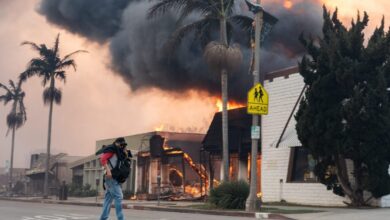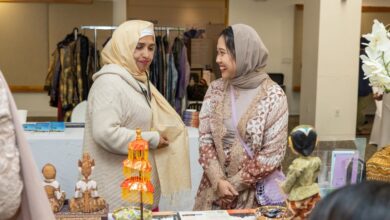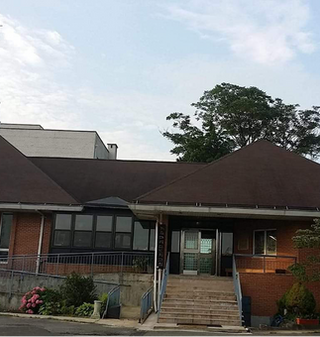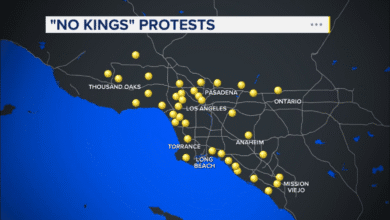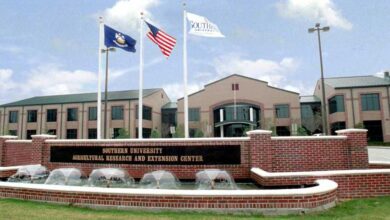News From Gaza Is Rekindling Trauma For Muslim Communities In Southern California

Every Friday night, the Islamic Society of Orange County mosque in Garden Grove becomes a gathering place. Children in the Muslim Youth Group meet to learn about their Islamic faith, then play and socialize on the mosque grounds. The adults unwind and catch up after a long week, seated under fairy lights around long tables.
News From Gaza Is Rekindling Trauma For Muslim Communities In Southern California
Until not long ago, the atmosphere here was typically lighthearted and relaxed. But the mood has changed since the Oct. 7 Hamas attack in Israel that claimed 1,200 lives, and Israel’s subsequent air strikes on Gaza, where as many as 19,000 people have since died.
Now these gatherings serve a bigger purpose: a supportive space for families to grieve and share very difficult feelings, as they cope with the images of destruction and loss.
Families visit the mosque from as far away as Redondo Beach and Pasadena, seeking community and respite. Parents talked while the children made posters using black, white, red and green paint, the colors of the Palestinian flag.
In one room crowded with kids, Tala Haddad held up a megaphone, belting out instructions for how to make bracelets. Haddad, 19, is a youth group coordinator with the mosque; each Friday she leads a group of kids ages 4 to 12. These days, she said, the goal is to give them a safe space to process feelings that may arise from watching the news, or from absorbing parents’ emotions at home.
“A really important thing is having those conversations so that they’re not just hearing things and having it stick with them,” Haddad said. “So … we have been allowing the kids to speak their mind within reason, and we’re giving them an outlet to talk to their youth group mentors, to talk to their parents. The parents are able to talk to us as well to ask for advice.”
Two teens attend Friday midday prayer at the Islamic Society of Orange County mosque in Garden Grove.
Samanta Helou Hernandez
/
LAist
)
Parents have been struggling, too. Among the dads volunteering that night was Ramsey Nashef, a Palestinian American born and raised in Orange County. He said as the father of two girls, 9 and 2, images he’s seen of dead and wounded children in Gaza have been haunting him.
“I have never been this vulnerable before, like, being emotional and crying, this is something that’s not normal to me,” Nashef said. “I just see myself breaking down and I’m like, my mental health is just kind of messed up at the moment.”

Ramsey Nashef, a Palestinian American father and graphic artist from Orange County, pictured with one of his paintings of a Palestinian boy throwing a stone.
Samanta Helou Hernandez
/
LAist
)
Nashef said he’s felt a duty to check for news, as much as it hurts.
“For me, as a Palestinian, I felt the need and out of respect to have to watch it,” he said.
Every morning, he said, it has felt “almost like I was torturing myself” as he logs in to watch videos of the devastation on Instagram.
A unique trauma
Seeing the images coming out of Gaza is “retraumatizing” for Arab American and Muslim communities, said Marwa Azab, a psychology professor at California State University Long Beach.
“It’s kindling and bringing back a lot of baggage that (was) hidden for a long time, we thought we dealt with,” Azab said.
Some who came as refugees carry trauma from wars and violence in their home countries like Syria, Afghanistan, and Iraq. For others, Azab said it’s experiencing anti-Muslim hate during 9/11 and other incidents that have added to the collective trauma of living as Muslims and Arab Americans in the U.S.

Hundreds of people attend Friday midday prayer at the Islamic Society of Orange County mosque.
Samanta Helou Hernandez
/
LAist
)
Now, with the pictures and videos coming out of Gaza, and in some cases personal loss, unresolved trauma has left the community “bleeding” emotionally, Azab said, “and there’s no healing that’s going to start if the bleeding doesn’t stop.”
‘Psychological resilience’
Azab has been giving talks at local mosques and around the community on what she calls “psychological resilience.” She tries to help people understand the trauma they are holding onto, and offers tips for coping with the distressing news.
An important one is limiting one’s time checking the news or looking at social media.
“They have to have a budget in terms of looking at these videos, because they will very quickly run into compassion fatigue,” Azab said. “Where the people they love and they desperately need to connect with, they won’t be able to.”
Being able to remain emotionally present for one’s family is key, she said. Timing news consumption is important, too, she said, because disturbing news can keep one up at night.
For intrusive thoughts during the day that interfere with work or school, Azab recommends writing those on a sticky note — and coming back to them later.
Azab also says people right now feel like they can’t express their grief, for fear of being misjudged — so community is important.
A FEW COPING TIPS
-
- Budget time for checking news and social media
- Be mindful of when you check (Will this news keep me up at night?)
- Write down intrusive thoughts on a sticky note, to return to later (i.e., ‘I’ll attend to you after I’m done studying’)
- Have a support system: have potlucks, see friends, meet at the mosque or community center
Stress on kids and parents
During recess one recent afternoon at the Orange Crescent School, on the grounds of the Garden Grove mosque, the sounds of laughter and children playing tag filled the air. Some kids kicked around a soccer ball, others played basketball. The tall steel fence around the campus was covered with posters expressing support for Palestinians in Gaza.

Children play during recess at Orange Crescent School located on the grounds of the Garden Grove mosque.
Samanta Helou Hernandez
/
LAist
)
School principal Maisa Youssef said that in the weeks following the Hamas attack, and Israel’s subsequent declaration of war, she began seeing a shift in the school community. The murder of 6-year-old Palestinian American boy Wadea Al-Fayoume in Chicago, which authorities are investigating as a hate crime, left students and parents feeling “definitely scared,” she said, “wondering if they are able to go to the store.” All of this has put undue stress on the kids.
“We’ve actually seen a decline” in children’s behavior, Youssef said. “I think kids are just in another space realizing they’re still processing.”
As for the parents, Youssef said, sometimes they “don’t want to talk, separating themselves from kids, being extra snappy, just kind of wanting to be alone.”
The school has shifted gears to incorporate mental health programming alongside lessons. The school recently hosted Azab to speak with parents, and has brought in mental health experts to speak with children and teachers as well.
Giving children ways to cope
Tala Haddad, the youth group leader at the Garden Grove mosque, is Palestinian American. Her parents came to the U.S. as refugees and settled in Orange County, where she was born and raised.
Between coaching the kids at the recent Friday night gathering, Haddad talked about how she feels a sense of survivors’ guilt when she thinks about how people in Gaza are living now. The vast majority of the population has been displaced amid the continuing airstrikes, and there is a lack of access to clean water. Recent flooding has made things worse.
“Anytime I do anything I feel so immensely guilty whether it’s little things like driving and knowing I’m gonna get to my destination safe,” she said. “Or putting my food in the microwave and knowing I’m having a warm meal.”

Children’s backpacks hang outside of a classroom at the Orange Crescent School, located on the grounds of the Garden Grove mosque.
Samanta Helou Hernandez
/
LAist
)
As a child, her family tuned in to in-language television news reports of violence in the Middle East. On TV Haddad would see “gruesome pictures of kids that were just like me” who had been killed. Then, on her drive to school, she said she would hear on the radio “these people deserve it, these people are terrorists, these people — they don’t want peace, they want chaos.”
This trauma followed her through childhood, she said. All through school, she would tell classmates she was Jordanian “because I felt like if I opened the door to being Palestinian, it would open so much resentment for myself and my family.”
“It definitely felt like a really, really heavy burden to carry,” Haddad said. “And I think that I carried that with me my entire youth.”
Now, as a youth coordinator, she wants to help children have an outlet for their emotions and a safe space to ask their questions.
These children, she said, should not have to carry a burden, “it’s not like they’re to blame for anything.”
What questions do you have about Southern California?


